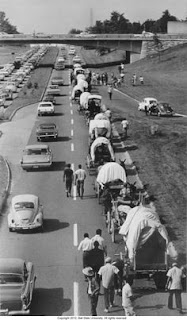Hosanna!
The pictures above are not typical "Palm Sunday" images. In fact, they are from the Poor People's Campaign, organized by Rev. Martin Luther King, Jr and the Southern Christian Leadership Conference in 1968. The campaign advocated for "the last to be first;" for our national priorities (and spiritual priorities) to focus on transforming extensive poverty in our land. One of the memorable expressions of the Poor People's Campaign was the Mule Train which started in rural Mississippi and traveled for weeks before entering Washington, DC. By this time Dr. King was dead, assassinated in Memphis, Tennessee in April 1968. But the movement. continued. I post these images because they remind me of Palm Sunday: a humble procession of God's people, mostly poor, accompanying Jesus as he rides on a donkey. They are entering the halls of power with their humility and witness to the priorities of God's love. On that first Palm Sunday, the followers of Jesus covered the road with their outer garments and with palms cut from the trees. They shouted "Hosanna!," an expression of celebration but also a word at its roots that meant "Save Now!" The two processions announce of a kingdom of God that looks very different than we often imagine. Read the Palm Sunday narrative again: Mark 11:1-11, Matthew 21:1-11; Luke 19:28-40; John 12:12-19.
What are your thoughts about both of these humble parades? How is God revealed in them?




Jesus was a person who loved people no matter what. And these pictures are of people that you might judge because they are pore and not like you, but those are the people that Jesus went to first.
ReplyDelete-Lizzie Flexer
I am not sure what happened to my original response, so I will try again. Liz, I agree that Palm Sunday was a sign of God's love for the those who were "left behind" or excluded from the blessings God had intended for everyone, for people--women, men, and children--who didn't matter to the powerful, to those that the religious people felt didn't belong or have a full share. It was an odd-looking and gracious parade, very humble and power-less looking next to the big military parades of Pilate and the Roman Empire, and out of step with the grand religious rituals of the Temple. Yet it incarnated the love of God, the greatest power above all others. As for the Mule Train and Poor People's Campaign, I remember it--I was around the same age as you and Mason are now. The people were grief-stricken over Dr. King's assassination, but prompted by the Holy Spirit. The Mule Train took many days to travel to Washington, DC. It set out from Marks, Mississippi, a community so poor that when Dr. King has visited there prior to his death he had been speechless and weeping at the poverty and struggles that people endured. The
ReplyDeletePoor People's Campaign advocated for living wages for all, support for families and communities so everyone would have the blessings God intended; that Jesus' promise that "the last would become first" would be realized in America. The scene of humble, loving people, poor and faithful, entering like Jesus into the seat of government with its pomp and privilege was an image that portrayed the uncomfortable truth for all to see--and an invitation to us all to let go of the life of inequality in order to find our common life as the citizens of God's realm of love!
From Bonnie Hill
DeleteScott, I just read your response again to Lizzie's wonderful response. Your words were so meaningful to me. I remember reading about the Poor People's Campaign but I don't think I've ever seen an actual picture of it. I was deeply saddened when I looked at the picture. It's so hard for me to believe that we would allow one another to take away their "God Given" right to freedom and dignity because of the color of their skin! The fact that this remains a part of our history makes me wonder if we ever truly learn anything from Jesus's journey and his resurrection? The word that best describes the parallel of Jesus's procession on the donkey and mule train would be "humbling'.